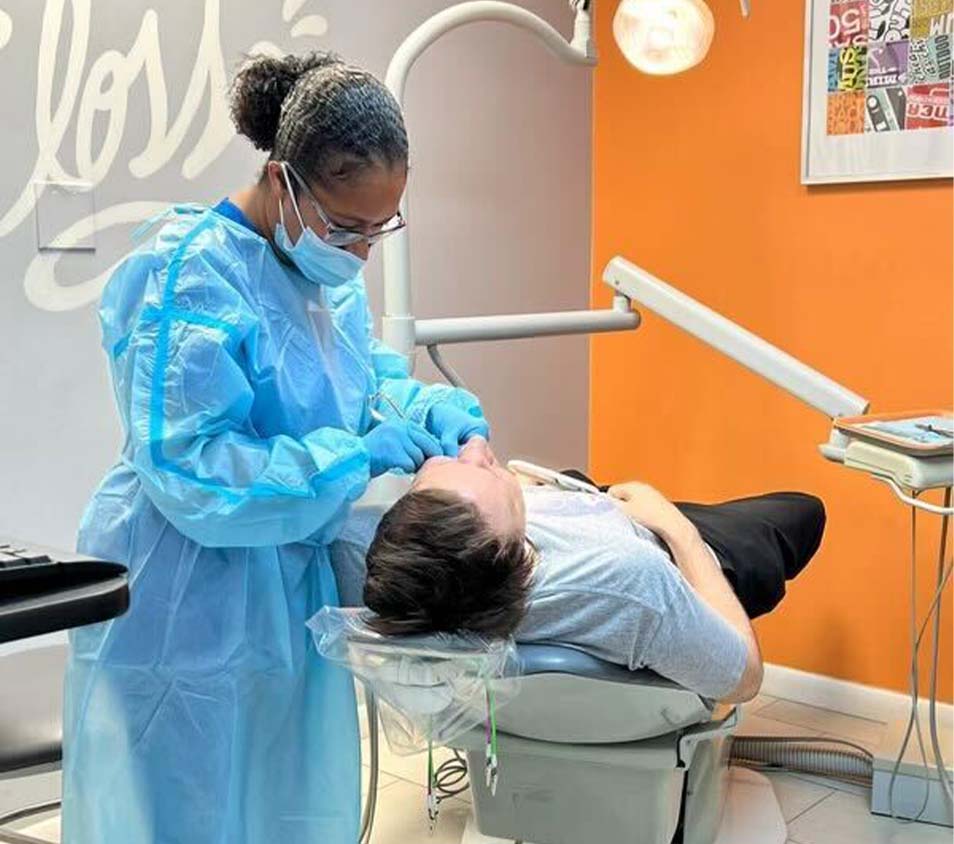Transform Your Dental Experience with Same Day Dental Crown Solutions
Transform Your Dental Experience with Same Day Dental Crown Solutions
Blog Article
Vital Dental Treatment Procedures for Keeping Healthy Teeth and Gums
Maintaining optimum oral health is critical for total well-being, and comprehending essential dental care procedures is the initial step towards achieving this goal. Normal dental check-ups and specialist cleansings play a pivotal duty in the early detection of prospective issues, while daily methods such as brushing and flossing are fundamental for combating plaque and food particles. In addition, dietary options dramatically affect the wellness of periodontals and teeth. As we discover these procedures and their effects, it ends up being noticeable that ignoring any element might cause unanticipated complications. What various other factors should be taken into consideration for detailed dental care?
Regular Dental Examinations
Regular dental exams are vital for maintaining optimal oral wellness and stopping prospective concerns. These consultations usually occur every six months and serve multiple purposes, including the early detection of dental problems such as tooth cavities, periodontal illness, and oral cancer. By determining these problems at their start, patients can gain from less intrusive therapies and boosted results.

In addition, regular examinations provide a chance for oral professionals to use customized guidance on dental health practices, dietary selections, and lifestyle adjustments that can enhance general dental health. Establishing a regimen of normal check-ups promotes an aggressive method to oral treatment, equipping people to organize their dental health and inevitably resulting in a brighter, much healthier smile. Neglecting these crucial check outs can result in much more extreme complications, highlighting their importance in precautionary oral care.

Professional Cleansings
A vital component of maintaining oral health is the professional cleaning performed by a dental hygienist. These cleansings, typically recommended every six months, are essential for the prevention of dental concerns such as dental caries and gum condition. Same Day Tooth Extraction. Throughout a specialist cleaning, the hygienist utilizes specialized tools to remove plaque and tartar buildup from the teeth and along the gum tissue line, areas that regular brushing may miss out on
The procedure begins with a detailed evaluation of the mouth. Following this, the hygienist utilizes a scaler to diligently scuff away solidified plaque. This is often complied with by a sprucing up therapy with a gritty tooth paste, which helps to eliminate surface stains and smooth the enamel. The hygienist may use a fluoride treatment to enhance the teeth and provide extra security versus decay.
Specialist cleanings not just boost the aesthetics of your smile however additionally substantially add to overall dental wellness. They enable very early discovery of potential issues, enabling timely treatment. By focusing on these cleanings, people can ensure that their oral health regimen is complemented by expert treatment, inevitably resulting in much healthier teeth and gum tissues.
Daily Brushing Methods
Reliable everyday brushing methods are essential for maintaining ideal dental health. Cleaning your teeth a minimum of two times a day, ideally in the morning and before bedtime, is crucial for removing plaque and avoiding tooth cavities. Pick a soft-bristled toothbrush that fits conveniently in your hand and enables very easy accessibility to all areas of your mouth.
When brushing, hold the tooth brush at a 45-degree angle to your gums. This setting aids to clean up not only the teeth but also the gumline, where plaque can collect. Usage mild, round movements as opposed to hostile back-and-forth strokes, which can hurt the periodontals and enamel. Ensure to comb for a minimum of two minutes, spending equivalent time on each quadrant of your mouth.
Don't forget to comb the inner surface areas of your teeth, as well as your tongue, to get rid of bacteria and refresh your breath. Establishing a regular brushing regimen will substantially contribute to the lasting health of your periodontals and teeth.
Effective Flossing Techniques
Flossing is a crucial element of a comprehensive dental health routine, playing a crucial duty in removing food fragments and plaque from areas that a toothbrush can not reach. Reliable flossing techniques can dramatically improve the wellness of your teeth and periodontals, protecting against tooth cavities and gum condition.
To begin, utilize around 18 inches of dental floss, winding completions around your center fingers, enabling much better control. Hold i thought about this the floss firmly in between your thumbs and forefinger, carefully guiding it in between your teeth with a sawing activity. Prevent breaking the floss, as this can trigger gum damages.
As soon as the floss gets to the gum tissue line, contour it into a C form against one tooth and slide it underneath the gum line gently, making sure to clean both sides of the tooth. Repeat this procedure for every tooth, using a tidy area of floss as you move from one tooth to the following.
It is suggested to floss at the very least daily, ideally prior to cleaning, to make best use of plaque elimination. Including reliable flossing techniques into your oral health routine will certainly add to general dental health and wellness, making it a crucial technique for maintaining healthy and balanced teeth and gums.
Nutritional Considerations for Oral Health
Many researches demonstrate that nutritional factors to consider play a critical function in preserving oral health and wellness and stopping oral problems. A well-balanced diet abundant in crucial nutrients is basic for the growth and maintenance of healthy teeth and gums. Trick minerals and vitamins, such as calcium, phosphorus, and vitamin D, contribute significantly to the toughness of tooth enamel and the general look at here now integrity of the dental tooth cavity.
Foods high in antioxidants, like vegetables and fruits, enhance gum tissue health and wellness by decreasing inflammation and combating oxidative anxiety. Sufficient hydration is essential; water not just assists in the production of saliva, which counteracts acids and washes away food fragments, however also aids in keeping a well balanced oral microbiome. Emergency Dentist DC.
Limiting these foods, along with exercising good oral health, is essential for dental wellness. Therefore, an all natural approach that includes mindful dietary options can substantially add to the avoidance of oral troubles and the promo of total dental health.
Conclusion

These visits commonly happen every 6 months and serve several objectives, consisting of the early detection of oral troubles such as cavities, gum condition, and dental cancer cells.During an examination, an oral specialist conducts a complete evaluation of the teeth, periodontals, and bordering dental frameworks.Furthermore, regular examinations give a chance for oral professionals to provide customized suggestions on dental health techniques, nutritional get redirected here choices, and way of life alterations that can boost overall oral health and wellness.In recap, preserving healthy teeth and periodontals necessitates adherence to important dental care treatments. Regular expert cleanings and oral exams assist in early detection of oral problems and the removal of plaque and tartar, specifically.
Report this page